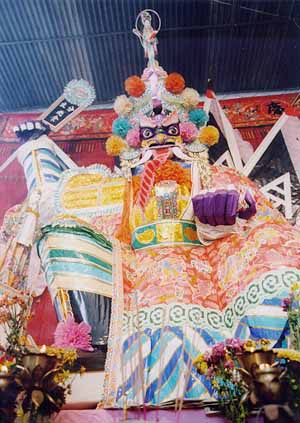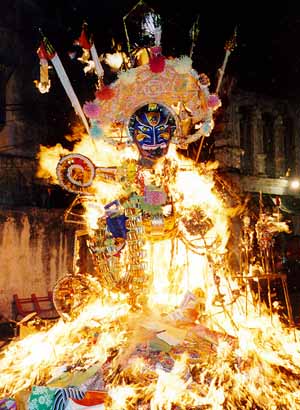
During the Festival of the Hungry Ghosts, a giant and fierce-looking effigy of the King of Ghosts (above) presides at the altar laden with offerings to appease hungry spirits. The effigy is burned (bottom left) after the rituals.
 During the Festival of the Hungry Ghosts, a giant and fierce-looking effigy of the King of Ghosts (above) presides at the altar laden with offerings to appease hungry spirits. The effigy is burned (bottom left) after the rituals. |
THE seventh month (chat yuet in Cantonese) of the Chinese lunar calendar this year began on Aug 14 and ends on Sept 12.
According to folklore, the King of Ksitigarbha would open the gates of Hell on the first day of the seventh lunar month to set hungry spirits free to roam the world of the living for a month.
During this period, the Chinese would make roadside offerings of food to the wandering souls. The "big feast" would be held on the 15th day (chat yuet sap ng), which is today, but some believers celebrated the feast on the eve last night.
The King of Ksitigarbha is said to be a kind prince of a kingdom in ancient Korea. Like the Buddha, he gave up royal trappings to become a monk. In his afterlife, he leads the 10 kings of Hell in judging the dead on their good and bad deeds.
Another tale says this king ruled the Magadha state in ancient India. He became one of Buddha's 10 disciples and was given the name Maudgalyayana.
Maudgalyayana was pained to see his dead mother's soul reaching for food which changed into burning coals at her touch. The Buddha told him that this was punishment for her sins and only with the combined power of all the monks could Maudgalyayana save his mother.
Thus on the 15th day of the seventh month, Taoists and Buddhists make offerings of incence and fruits to Buddha and his disciples, in the hope of freeing their parents' souls from the sufferings of Hell.
The late Tan Sri Lee Siow Mong wrote in his book Spectrum Of Chinese Culture that the Feast of the Hungry Ghosts or Wandering Souls had its origin in the tale of how Mulian rescued his mother from Hell.
Mulian was instructed by the Buddha to hold a feast for wandering spirits on the 15th day of the seventh moon to save his mother from the tortures of Hell. His mother's sins were eating meat and slaughtering dogs for food.
The Hungry Ghost Festival is an annual celebration in Malaysia. A colourful affair indeed, open-air operas are staged in market places and temples during the festival to "entertain" the spirits.
In Penang, these public shows are known as the tua peh hee in Hokkien (opera performances) or phor tay hee (puppet shows), which on other days are also staged to celebrate the birthdays of Chinese deities.
The belief is that the opening night of festival operas are meant for audiences from the netherworld, and "spiritually-weak" people are warned against watching the shows.
In Penang, the Hokkiens address the king of ghosts as the phor thor kong. The phor thor kong has four assistants to help in keeping wayward spirits in line and prevent them from causing harm to the living.
 The Chinese also believe that Hell has two
jailers - the Ox Head (in Cantonese, ngau thau)
and Horse Face (ma min) entities who wield a trident and
a spear respectively. Both have human-like bodies but the heads
of such creatures.
The Chinese also believe that Hell has two
jailers - the Ox Head (in Cantonese, ngau thau)
and Horse Face (ma min) entities who wield a trident and
a spear respectively. Both have human-like bodies but the heads
of such creatures.
According to the book Mooncakes And Hungry Ghosts, the Feast of the Hungry Ghosts is the second festival of the dead. The first is qing ming when Chinese families make offerings and prayers to their ancestors.
In the Feast of the Hungry Ghosts, the people offer prayers and food to all spirits in general, especially the departed who had no kinfolk to do so for them. The belief is that if the spirits are not pacified, they would be restless and cause mischief among the living.
In Taiwan, Buddhist and Taoist priests perform rituals and offer incense, paper clothes and Hell money to the ghosts on the 15th day. These rituals culminate in the priests tossing out buns and candies, supposedly to the hungry ghosts, but worshippers would shamelessly rush for the treats, behaving like hungry ghosts themselves!
In a small rural community in northern Taiwan, the ghost-feeding ritual only begins about lunchtime on the 17th day. The ghosts are feted with uncooked rice, raw noodles, unpeeled fruits and uncut meats. Stacks of paper ingots, Hell money, and suits of paper attire are burnt as material gifts for the spirits. Some affluent families would burn paper mansions complete with "cars," "servants" and other luxury items.
In Hong Kong and Taiwan, some folks release beautifully decorated paper boats and water lanterns downstream in a ceremony called the Release of the Water Lanterns (fangshuideng, in Mandarin) on the evening before the Ghost Festival.
On the riverbanks, priests would conduct rituals to invoke Heaven's blessings and to invite the souls of the drowned to the following day's feast.
In many of the coastal provinces of pre-revolutionary China, there used to be a ritual (no longer in practice now) in which children with lanterns would march in the streets and chant rhyming couplets for the benefit of "visiting" ghosts.
In Malaysia, the seventh month is a period when the Chinese take extra caution not to offend denizens from the netherworld. Where possible, activities such as marriages or house-moving are postponed.
There is an urban legend in Penang concerning the King of Ghosts, which supposedly took place some 15 years ago.
A woman left her infant on the table of offerings before the altar of the King of Ghosts when she went about with her prayers. When she returned, she found her baby dead.
The story is that the King of Ghosts had assumed the infant to be part of the offerings to him and thus fed on it.
